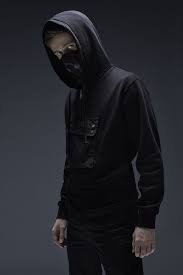When I’ve gone to clubs or events that had a DJ, I’ve often wondered, “What are they doing up there? Just jumping and dancing around and pushing buttons?” But DJs do so much more than just play recorded music and push buttons.
What is a DJ? A DJ is a person who plays recorded music for an audience. DJs spend a lot of time researching music, gathering music, and practicing techniques with their equipment to beat-match or blend the elements of one song into another so that they create seamless, non-stop audio stimulation for the crowd.
For the casual observer watching a DJ in a club, it may seem like the easiest, most fun job there is. What people don’t see is the work and practice that goes into being a DJ, which is just one of the things I’ll cover about the career in this article.
Table of Contents
What is the History of the DJ?
The term “disc jockey” was originally coined in the 1940s and was meant to describe radio personalities who introduced songs on the air. Once DJing became something other than just playing songs – songs were remixed and used to make new songs – the term was meant to be a bit disparaging. DJs were often seen as lesser than musicians. Why? Because in most cases, DJs use someone else’s music and remix it into something else.
They weren’t seen as the original creatives behind the music. But that’s no longer always the case. Unless you’ve been asleep for the past 30 years, you know that DJs no longer support the show – they are the show. DJs are headlining their own tours, now. In many cases, DJs are sought after by other musicians for collaborations – which can be fortuitous on both sides for exposure and for creativity’s sake.
DJs can take an otherwise mediocre song and bring it back to life for the charts. They can take chart-toppers to a whole new level, because of their remix versions. The goal is to accentuate the music for the audience. In many cases, DJs don’t just reintroduce songs with a new twist to them, they promote new songs. At this point, the music industry accepts the role of a DJ with open arms.
What Does a Good DJ Do?
DJs from the start of their career to those that are famous enough to help sell out arenas all handle booking gigs, networking, making recordings, and keeping creative juices flowing throughout their career. They have to have the technical aptitude to keep their rigs working and understand the flow of the beat and music well enough to be able to move from one song into the next with no disruption. True, some DJs out there just hit some buttons, and rely on audio effects and lighting to cover up a lack of skill and preparation. But that’s not the case for most.
Everything I make as a producer, I visualize it as a DJ first. And all those beats, I test them as a DJ.
David Guetta –Tweet
A good DJ has to become familiar with transitioning the tempo of the current playing song to the next song so that the flow and vibe are not lost and the audience stays happy. This is called beat-matching, and it takes both talent and skill learned from practice. They collect music that they listen to and know inside-out so that they can then use it in their shows. Some will add musical elements of their own. DJs should be completely versatile while performing.
Did you know that DJs are often the source of new music? They will use familiar music to get things going at their performance and then play tracks that aren’t as well-known, beat-matching them to get them into the flow and then remixing them into the show. And that’s how some music gets discovered and promoted.
What Tools Do DJs Use?
Most DJs have adapted with technology so that now they’re looping, beat-matching, adding music, scratching, and even creating live remixes for their audience. They can adjust the bass, the treble, add an echo, or play sound samples within other songs. Whether they use specialized digital software, analog turntables, and mixers, or all-in-one controllers to produce their shows – there is a normalized, industry-standard configuration to this. Usually, there will be a platter (or turntable) on the left of a mixer and then another on the right of the mixer.
Even on the all-in-one, the setup is standard. Music comes from a source – a vinyl record, a USB drive, or a computer/laptop – to the platter on the equipment of choice. That platter might be on a standard analog turntable, a CDJ (a digital version of the turntable), or through one of two sides to an all-in-one setup called a DDJ or Controller Deck. In these left and right areas, you can manipulate the sounds of the music to a certain extent. But the beat-matching and other effects that go into creating a new sound from the songs chosen? That happens using the mixer, which is usually in the middle.
Now, these three components are definitely not the only tools a DJ may be using. Headphones are very much necessary to a DJ, as well as his speakers. Spare wiring, as many components as they are accustomed to using, and their source equipment and all that goes with that need to be remembered. After all, beyond the entertainment and audio construction, a DJ has a very technical job and uses technical equipment. Sometimes these things are provided by a venue, sometimes not. And in the case of a home-studio DJ – they need to have everything for a gig or a project (should they be remixing and recording).
What Do DJs Get Paid For?
People just don’t realize that what a DJ gets paid for is not just the work during their set or performance, it’s for all of the prep work beforehand that is largely unseen. They have to line up their musical sets. They’ve needed hours of practice to know where on the mixer to turn for the proper effects and transitions. They have to set up and tear down. This includes hours of work before and after their performance.
The types of DJs vary greatly depending upon the location of the DJ set – live, studio, or even on the radio where the rules and responsibilities differ all the more. Depending on the type of DJ, the work can differ greatly. The most important thing they get paid for is entertaining. To that end, I’ve seen DJs scratch records to intro the beats, looping, change EQ and key, and change tempo speeds to transition perfectly.
They use the buttons and dials to create these special sound effects and make the music perfect. They use visual effects to go with the show, dance and get the crowd pumped as they work, and create live mashups and remixes of songs. All of this to provide entertainment.
Club/Resident DJs
There are resident or club DJs who are known to specific venues within a city or geographical area. These DJs become known for their particular style and performances for the clubs they frequent. Most of these DJs perform live sets, meaning they can adapt their music on the fly in response to their audiences. They re-edit, remix, and transition live and on-demand. It also means each performance is guaranteed to actually be a unique listening experience.
These DJs improvise based on their crowd. Because they have a concept of the audience in a particular club, they may pre-plan their music sets with true crowd-pleasers. But the planning should only go to a certain extent. After all, true talent comes with improvisation. Knowing how long to play a track, when to mix, when not to mix, when to transition – all based on your live audience is part of the show.
You have to keep in mind that these DJs often also get a percentage of the bar, so they have to help keep a steady flow from the dancefloor back to the bar and then be able to get a good read on when to push that energy level back up to get people back into the music and on the dancefloor again. And there are always nights when a particular hit suddenly flops. The DJ needs to be able to read the crowd and be able to transition to another song to keep the vibe.
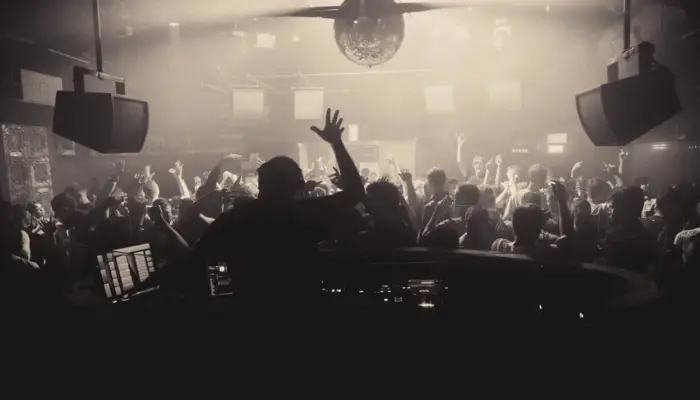
Mobile/Touring DJs
There are touring or mobile DJs that go from place to place and come to clubs or events as “special guests”. There are commercial DJs, like the ones that go to large events like weddings and corporate fundraisers. These DJs have to be comfortable in Top 40 or commercial dance music. They usually get on the mic more than the turntablists, because they’re there to encourage the crowd more. If the DJ gets big enough in the industry, they might be on tour and that takes a lot of extra work.
Touring DJs on the festival or headliner DJs usually plan out everything on their show from beginning to end. That doesn’t mean they won’t improvise, but they go in with a plan – definitely. These kinds of DJs usually also have a lot of pre-planned visual effects that have to go along with the music properly. These things have to sync, so they have to keep that in mind with every transition.
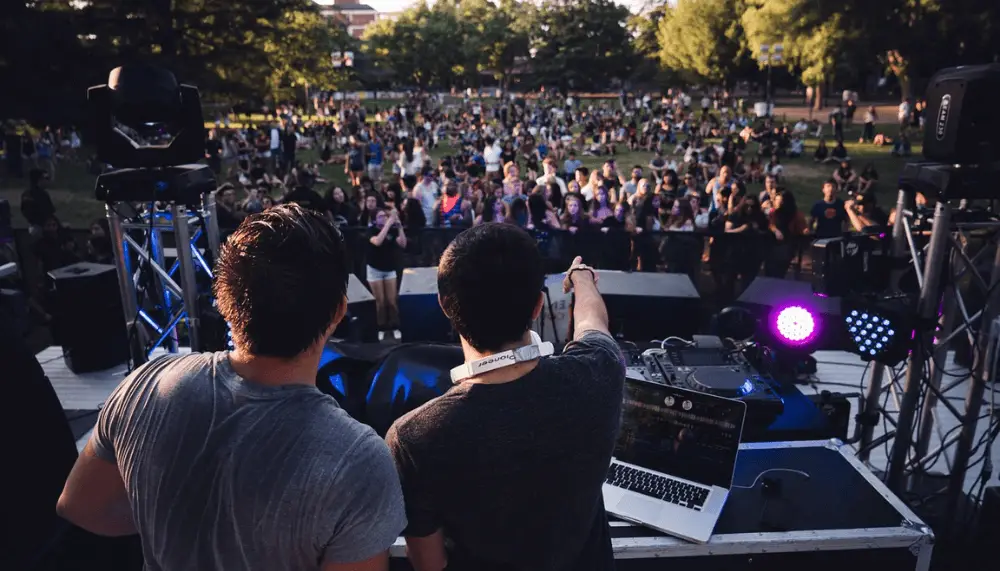
Radio DJs
And then that leads me to radio DJs – who use the mic most of all. They may still use the term “DJ” or “disc jockey” to describe the job, but the role is vastly alienated from what DJs are in modern times. These “radio presenters” or “radio personalities” actually play tracks that are usually pre-synced through computers.
More often, they present information more than music, unless the programming is specialized specifically for dance. That’s not to disparage the original radio disc jockeys, who were essentially responsible for giving so many genres of music a world stage.
Radio hosting is the more common terminology. They play music, interact with listeners, interview artists, discuss the news, and sometimes attend special events for their employer – this could be a broadcast, satellite, or internet radio station. Sometimes a radio show gets syndicated and it is sold to be programming in multiple places, including as podcasts.
Most of what a radio DJ does is live broadcasting, but not in front of a crowd. It is in-studio and the main thing for them to understand is that their audience has expectations and they are to meet those expectations as best they can.
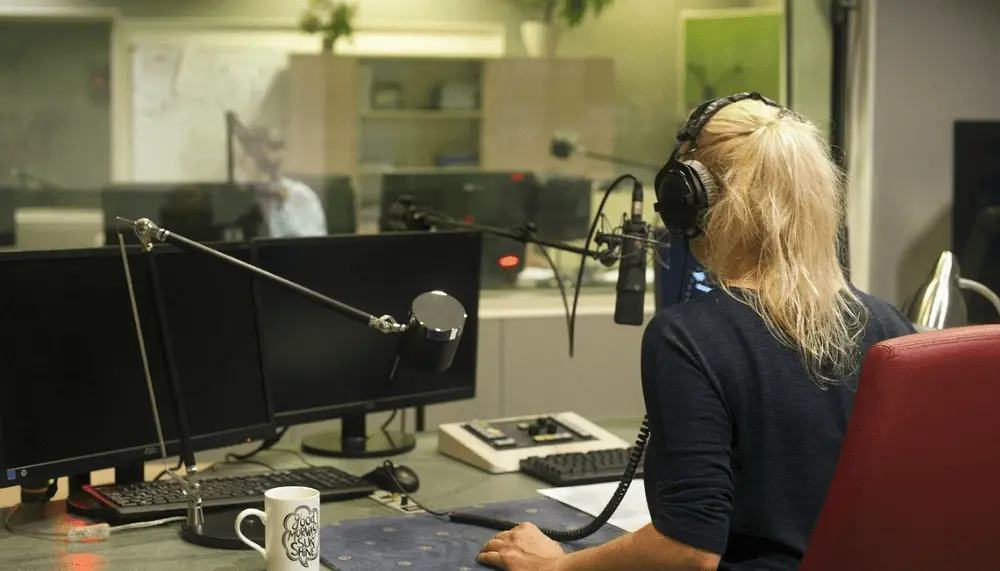
Turntablists
This word was originated to punctuate the difference between DJs that played and mixed music and DJs that perform by physically manipulating records, the stylus, and the turntables to produce new sounds. They use analog turntables with actual vinyl records or digital vinyl systems to generate very specific effects on their music of choice for their audiences. These are DJs that have put time and practice into honing their art.
A phonograph in the hands of a ‘hiphop/scratch’ artist who plays a record like an electronic washboard with a phonographic needle as a plectrum, produces sounds which are unique and not reproduced—the record player becomes a musical instrument.
John Oswald – Tweet
They usually have two or more turntables, headphones, and a crossfader or mixer between them that will transmit the sounds made to whatever needs it – speakers or the proper broadcasting equipment. They loop favorite portions of tracks on vinyl to extend the breaks between songs to transition. Scratching the vinyl and beat juggling became an art form born from the turntablist DJs.
These were the first DJs in the Hip Hop industry to make big names for themselves. These are exhibitionists who are known as masters of the craft because they use their tools like musical instruments to make exclusive sounds. These DJs are the closest in talent and skill to musicians without actually having to be a musician. Some people akin them to percussionists.
Depending on the music selected by the DJ and their style, a turntablist can create rhythmic accompaniment, percussion breaks, basslines, beat loops, atmospheric thrusts of sudden chords, or interwoven melodic lines. It takes hours and hours of practice to perfect this skill. They’re not just pulling a song into a queue via digital means, they are physically manipulating the album using their hands to stop, slow down, speed up, or spin the record opposing the turntable’s spin to create that rhythmic scratching that is a well known sound effect in Hip-Hop music.
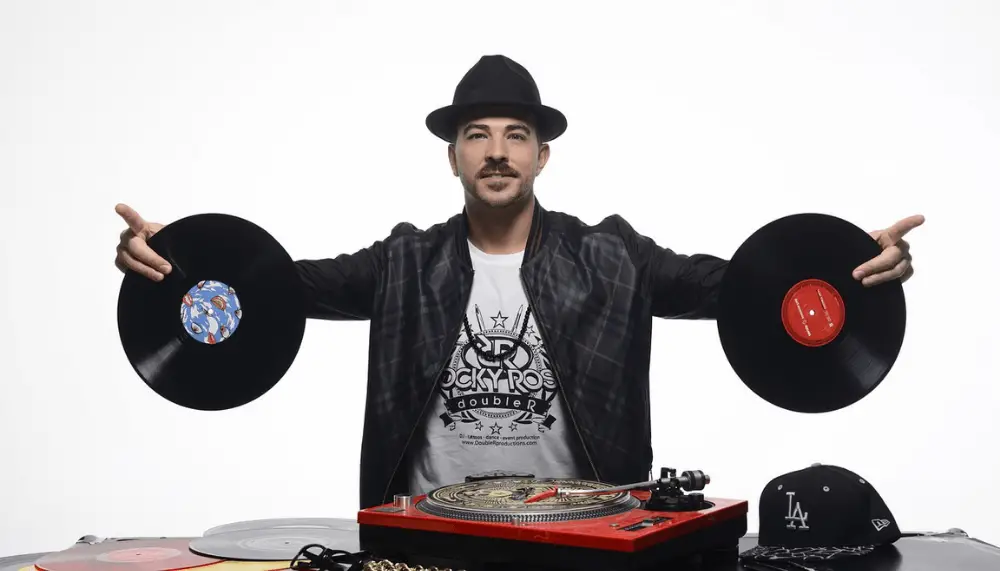
DJs That Are More…
Some DJs are also trained musicians. Their knowledge of not only their tools but of musical theory makes them a more formidable force in their art. As such, their equipment might include electronic instruments, such as synthesizers, drum machines, and keyboards. Often, they have their own musical samples to toss into any live mix they may be performing.
A lot of DJs have now stepped into the world of audio engineering and producing. And that step has been lucrative! If they are performing their own music, that means they are the experts of breaking it down and spinning it out. They can create remixes of their own music that have never been heard before, live.
If they are producing their own music, that’s generally most of what they will play at a performance, promoting themselves and their music in the package. However, most DJs will lean toward a varied arrangement of music, not just their own. This leads to collaborations that can be inspiring and help promote both themselves and others in the industry.
Who better to produce music in the genre they work in than themselves? No one knows their music or their artistic vision better. This often leads others to be produced and promoted by them.
Who Has What It Takes To Be A DJ?
No matter what type of DJ, they all need the same drive to keep the momentum of the moment going. They just have different skill sets that they use for this common goal. It’s all about creating unique moments in time that people can never get back. Each show is different, each transition varies. More than anything, it’s about entertaining.
A truly good, professional DJ has oftentimes spent as many hours honing their skills as the musicians whose tracks they play. They need to be willing to practice and get used to improvisation in order to be remembered for unique remixes and be called back again and again.
If you want some excellent examples of DJs, feel free to look into these:
Nicholas Miller aka Illenium – Future Bass / Trap / Dubstep
American Musician, DJ, and Record Producer
Marshmello aka Dotcom – EDM / Bass / Trap / Progressive House
American DJ, Record Producer, and Internet Personality
Nick Leonardus van de Wall aka Afrojack – House / Dance Pop / Trap / Bass
DJ, Remixer, Record Producer
David Guetta aka “The Grandfather of EDM” – Dance Pop / EDM / House
French DJ, Songwriter, Instrumentalist, and Record Producer
